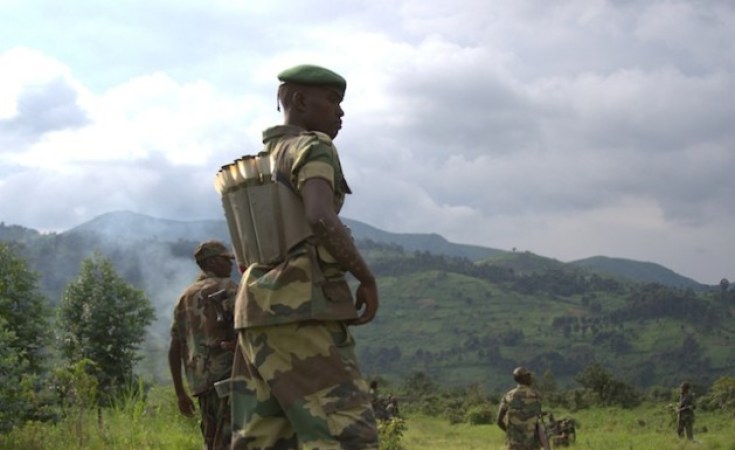Lawmakers from the Great Lakes Region have condemned ethnically motivated violence and discrimination in eastern DR Congo, and called on the international community to consider the root causes of conflicts in the volatile region.
On Monday, February 26, Rwanda Senate President Francois Xavier Kalinda hosted representatives of the Forum of Parliamentarians of the International Conference on the Great Lakes Region (ICGLR), who are in Rwanda as part of a regional fact-finding mission on conflict in eastern DR Congo, in particular the war between the Congolese government and the M23 rebel group.
The delegation led by the Speaker of South Sudan's National Assembly Jemma Nunu Kumba also seeks to find information about the diplomatic tension between DR Congo and Rwanda, which resulted from the Congolese government's allegations that its neighbour supports the rebels.
ALSO READ: FDLR integration into DR Congo army must be addressed - Kagame
The Rwandan government dismisses the allegations, saying the conflict resulted from longstanding issues of bad governance in DR Congo and the collaboration of the Congolese armed forces and the FDLR, a UN-sanctioned terrorist group linked to the 1994 Genocide against the Tutsi in Rwanda.
"As parliamentarians of the region, we believe in dialogue, and military action is not a solution to any problem. We encourage dialogue," said Kumba, the forum's president.
"We will do our analysis and recommendation that the root causes of the problem need to be identified and addressed as the first step towards solving the problem, and that there must be political dialogue between Rwanda and [DR Congo]."
The ICGLR lawmakers' visit aims at collecting the views of Rwandan leaders about the conflict in DR Congo, said Kumba, adding that they want to find out what Rwanda thinks are the root causes of the problem, and its opinion about the Nairobi and Luanda processes led by the former president of Kenya Uhuru Kenyatta and Angola's President Joao Lourenço.
"We found that Rwanda is for dialogue and thinks that dialogue is important to solve the problem and that though the problem is being addressed by the regions and the international community, they have not looked critically into the root causes of the problem," she said.
"That's where we should start if we want to really solve this instability in [DR Congo]. We need to look at the root causes, especially the situation of harassment and violence against communities in eastern DR Congo," Kumba noted.
ALSO READ: DR Congo's Rwandophone question: What US govt, SA, Tanzanian leaders have said
For over 60 years, Kinyarwanda-speaking Congolese communities (also referred to as Rwandophones) have been the target of ethnically motivated violence and denied their citizenship rights, sometimes called Rwandans.
"The identity of these people needs to be recognised because they are Congolese," Kumba said. "We cannot undo what was done by the colonial powers to divide a country. It's a common issue all over Africa; our boundaries were demarcated by the colonialists. Kingdoms were split and communities in new countries and they had to be recognised."
ALSO READ: Rwanda ensures defence measures amid 'serious threat' from DR Congo
She said they also took note of Rwanda's concerns about the presence of foreign armed groups in eastern DR Congo, especially the FDLR.
In DR Congo, Kumba said, "there are many other conflicts and we ask the government of Congo to address those other grievances because there are over 200 armed groups, and they need to sit and address those governance issues."
The ICGLR Forum of Parliamentarians have previously visited DR Congo and Angola. After Rwanda, they will also visit Uganda and Kenya.
During their seven-day visit in Rwanda, the lawmakers will also meet officials from the Rwandan government, Congolese refugees in Rwanda. They will also visit Mutobo Demobilisation and Reintegration Centre in Musanze District where they will meet former combatants of armed groups based in DR Congo.
Senate President Kalinda said the delegation of ICGLR parliamentarians was informed about Rwanda's position on the decades-old conflict in eastern DR Congo and its security concerns.
"The presence and preservation of the FDLR on the border of Rwanda, and their association with the [Congolese army] in the war against the M23, remain a serious security threat not only to Rwanda but also to the entire region," Kalinda said.
"Rwanda remains committed to regional initiatives to resolve conflict in [DR Congo], notably the Luanda and Nairobi Processes. The root causes of conflict must be holistically addressed to achieve sustainable peace and stability in [DR Congo] the Great Lakes Region."


